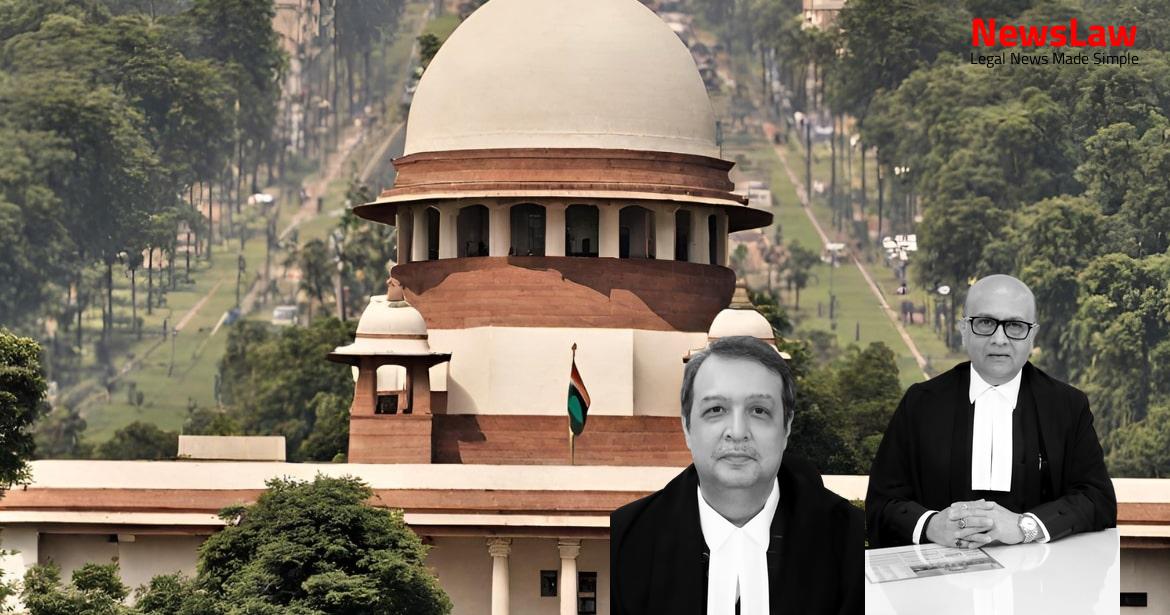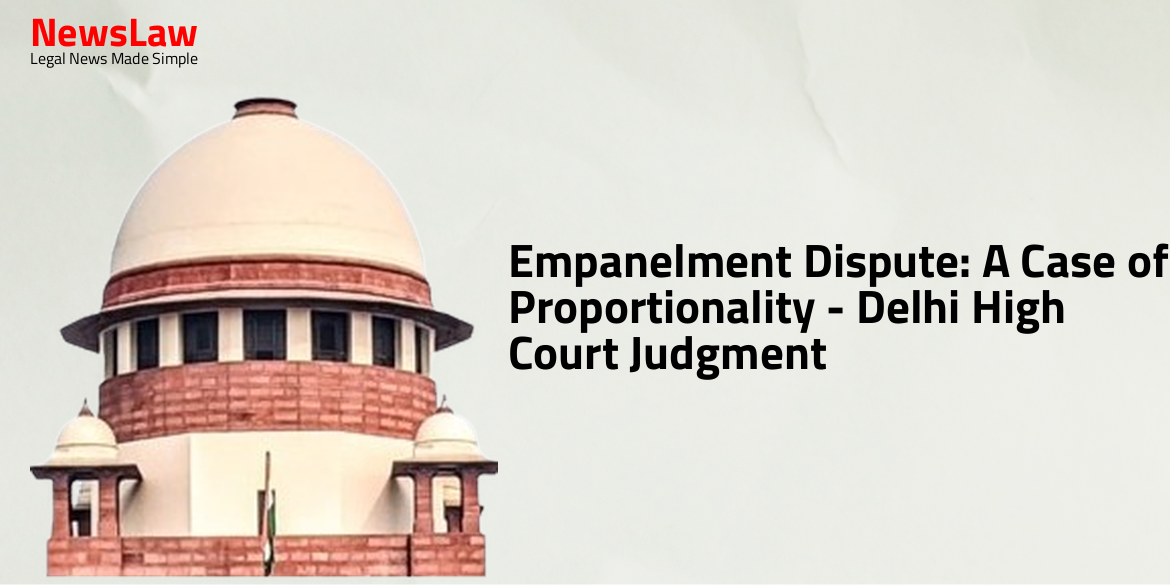No 2315 of 2021, whereby the appellant’s appeal against the order of the National Company Law Tribunal, New Delhi dated 05.04.2021 has been dismissed. On 28.10.2010, one of the plots of land acquired by it, namely, Plot No 01-C, Sector 16C, Greater Noida, District Gautam Budh Nagar, U.P., was allotted, by way of lease for 90 years, to M/s. However, the RP treated the appellant as an operational creditor and, vide e-mail dated 04.02.2020, requested the appellant to submit its claim in Form B, as an operational creditor of the CD. In the two applications referred to above, the appellant pleaded, inter alia, that, — (a) there was gross error on part of the RP in treating the appellant as an operational creditor, particularly, when it had no adjudicatory power under Regulation 13 of The Insolvency and Bankruptcy Board of India (Insolvency Resolution Process for Corporate Persons) Regulations, 2016 ; (b) the resolution plan erroneously states that appellant did not submit a claim when, in fact, it was submitted; (c) appellant being owner of the land with statutory charge over assets of the CD ought to have been given top priority for its dues as a secured creditor; (d) no opportunity of hearing was given to the appellant by the COC, and the entire process right up to the approval of the plan by the Adjudicating Authority was ex parte. Aggrieved with the order of the NCLT, the appellant filed an appeal before the NCLAT, inter alia, on the following grounds: (i) The appellant was a financial creditor and, therefore, ought to have been a member of the COC. Additionally, the appellant was neither informed of the meetings of the COC nor adequate amount, commensurate to its status as a secured creditor and owner of the land with Civil Appeal Nos.7590-7591 of 2023 statutory rights, was allocated to it in the resolution plan, which is violative of the provisions of Section 30(2) of the IBC; and (iv)
The appellant was dismissed by observing, inter alia, Civil Appeal Nos.7590-7591 of 2023 (i) the materials on record reflect that the RP had informed the appellant vide e-mail dated 04.02.2020 about its status as an Operational Creditor and to submit its claim in Form ‘B’, yet the appellant chose not to file its claim; (ii) in New Okhla Development Authority vs Anand Sonbhadra, it was held that disbursement is an indispensable requirement to constitute a financial debt within the meaning of Section 5(8) of the IBC and, that too, the disbursement must be from a creditor to a debtor, and as the lease executed by the appellant was not a financial lease or capital lease, the appellant does not qualify as a financial creditor; Civil Appeal Nos.7590-7591 of 2023 (iii) the resolution plan was approved by the Adjudicating Authority on 04.08.2020, and the successful resolution applicant (SRA) seeking implementation of the plan informed the appellant vide letter dated 24.09.2020 about the plan, yet I.A.
Also Read: https://newslaw.in/case-type/criminal/alleged-misuse-of-official-position-courts-legal-analysis/
Even if the appellant was not a financial Civil Appeal Nos.7590-7591 of 2023 creditor, the resolution plan ought to have noticed its claim as a secured creditor whereas the order of approval dated 4.8.2020 describes the appellant as one who did not submit its claim.
(c) At the time of approving the resolution plan, the adjudicating authority failed to consider whether the plan had made provisions commensurate to appellant’s claim, and the statutory charge which the appellant enjoyed over the assets of the CD. Abhishek Manu Singhvi, leading the arguments on behalf of the respondents, submitted that the issue as to whether dues payable to an Industrial Area Development Authority, like the appellant, towards lease/ allotment premium / rental, would be a financial debt or not is no longer res integra, as it stands settled by a decision of this Court in Anand Sonbhadra (supra), wherein it has been held that it is not a financial debt. The manner in which a public announcement is to be made and claims are to be submitted, is described in the CIRP Regulations 2016. Whereas Regulation 8 deals with submission of a claim by a Civil Appeal Nos.7590-7591 of 2023 person who claims himself to be a financial creditor.
Once a claim is submitted with proof under any of the Regulations (i.e., Regulations 7, 8, 8-A, 9 and 9-A), the Civil Appeal Nos.7590-7591 of 2023 IRP or the RP, as the case may be, as per Regulation 13, has to verify the claim, as on the insolvency commencement date, and thereupon maintain a list of creditors containing names of creditors along with the amount claimed by them, the amount of their claims admitted and the security interest, if any, in respect of such claims, and update it in terms of Regulation 12 A. As per Section 21 (2) of the IBC, subject to other provisions of Section 21, the COC must comprise all financial creditors of a CD. Civil Appeal Nos.7590-7591 of 2023 25.
Civil Appeal Nos.7590-7591 of 2023 25.
Based on the information memorandum, when a resolution plan is submitted by a resolution applicant, eligible under Section 29-A of the IBC, the RP is under an obligation to examine whether the resolution plan(s) received by him conform(s) to the conditions referred to in Civil Appeal Nos.7590-7591 of 2023 sub-section (2) of Section 30 of the IBC as elaborated in Regulations 37 and 38 of the CIRP Regulations 2016. As per sub-section (1) of Section 31 of the IBC, if the Adjudicating Authority is satisfied that the resolution plan as approved by the COC under sub-section (4) of Section 30 meets the requirements of sub-section (2) of Section 30, it has to approve the resolution plan. The RP on commencement of CIRP is required to issue a publication inviting claims from all the stakeholders; thereafter, on basis of claims received, the RP is required to collate the information and submit necessary details in the information memorandum; the resolution applicant(s) submit their plan(s) on the basis of the details provided in the information memorandum; the resolution plan(s) undergo deep scrutiny by RP as well as COC; in the negotiations that may be held between COC and the resolution applicant, various modifications may be made so as to ensure that while paying part of the dues of financial creditors as well as operational creditors and other stakeholders, the CD is revived and is made an on- going concern; after COC approves the plan, the adjudicating authority is required to arrive at a subjective satisfaction that the plan conforms to the requirements as are provided in sub-section (2) of Section 30 of IBC; and Civil Appeal Nos.7590-7591 of 2023 only thereafter, the adjudicating authority can grant its approval to the plan. In consequence, even if a claim submitted by a creditor against the CD is in a Form not as specified in the CIRP Regulations, 2016, the same has to be given due consideration by the IRP or the RP, as the case may be, if it is otherwise verifiable, either from the proof submitted by the creditor or from the records maintained by the CD.
Once that exercise is over, the plan is submitted for approval of the Adjudicating Authority, which must, under sub-section (1) of Section 31, satisfy itself as to whether the plan approved by COC under sub- section (4) of Section 30 meets the requirements as referred to in sub-section (2) of Section 30 of IBC.
In Jaypee Kensington Boulevard Apartments Welfare Association vs NBCC (India) Ltd., a three- Judge Bench of this Court had occasion to examine the scope of judicial review exercisable by: (a) the Adjudicating Authority, under Section 31 (1), over a resolution plan approved by the COC; and (b) the Appellate Authority exercising its power under Section 32 read with Section 61 (3) of the IBC. (Emphasis supplied)
In light of the analysis of the provisions of the IBC and the Regulations framed thereunder, in our view, though commercial wisdom of the COC in approving a resolution plan may not be justiciable in exercise of the power of judicial review, the Adjudicating Authority can always take notice of any shortcoming in the resolution plan in terms of the parameters specified in sub-section (2) of Section 30 of the IBC coupled with Regulations 37 and 38 of the CIRP Regulations 2016. In the instant case, a perusal of the approval order dated 04.08.2020 would reveal that the resolution plan put forth by the resolution applicant refers to the appellant as a creditor who had not submitted its claim. 43,40,31,951/- ; (b) the appellant had a statutory charge over the assets of the CD; (c) the entire land over which the project has been conceived is owned by the appellant; (d) a notice to cancel the lease for non-payment of dues had already been served on the CD; and (e) without approval of the appellant, the plan was not feasible. Per contra, on behalf of the respondents, it was urged that,- (a) the appellant had pressed its case only on the ground that it was a financial creditor, once this plea is found unsustainable, no relief can be granted to the appellant, as commercial wisdom of the COC is not justiciable; (b) NCLT has no power to recall its order of approval, the remedy for the appellant was to file an appeal within the time provided by the statute; and (c) there has been inordinate delay on the part of the appellant in questioning the order of approval. Though a challenge to this finding has been laid but, during the course of arguments, the learned counsel for the appellant failed to demonstrate as to how could the appellant be considered a financial creditor. Sub- section (5) of Section 60 provides that notwithstanding anything to the contrary contained in any other law for the time being in force, the NCLT shall have jurisdiction to entertain or dispose of: (a) any application or proceeding by or against the corporate debtor or corporate person; (b) any claim made by or against the corporate debtor or corporate person, including claims by or against any of its subsidiaries situated in India; and (c) any question of priorities or any question of law or facts, arising out of or in relation to the insolvency resolution or liquidation proceedings of the corporate debtor or corporate person under the IBC. Section 408 of the Companies Act is in following terms: “The Central Government shall, by notification, constitute with effect from such date as may be specified therein, a tribunal to be known as the National Company Law Tribunal consisting of a President and such number of judicial and technical members as the Central Government may deem necessary, to be appointed by it by notification to exercise and discharge such powers and functions as are, or may be, conferred on it by or under this Act or any other law for the time being in force.” Rule 11 of the National Company Law Tribunal Rules, 2016, framed under Section 469 of the Companies Civil Appeal Nos.7590-7591 of 2023 Act 2013, which is in pari materia with Section 151 of Code of Civil Procedure, 1908, preserve the inherent powers of the Tribunal in the following terms: “Nothing in these rules shall be deemed to limit or otherwise affect the inherent powers of the Tribunal to make such orders as may be necessary for meeting the ends of justice or to prevent abuse of the process of the Tribunal.” The Section itself says that nothing in the Code shall be deemed to limit or otherwise affect the inherent power of the Court to make orders necessary for the ends of justice.
But it is a well-known rule of statutory construction that a Tribunal or body should be considered to be endowed with such ancillary or incidental powers as are necessary to discharge its functions effectively for the purpose of doing justice between the parties. If a judgment has been pronounced without jurisdiction or in violation of principles of natural justice or where the order has been pronounced without giving an opportunity of being heard to a party affected by it or where an order was obtained by abuse of the process of court which would really amount to its being without jurisdiction, inherent powers can be exercised to recall such order for the reason that in such an eventuality the order becomes a nullity and the provisions of Section 362 CrPC would not operate. In our opinion a tribunal or a court may recall an order earlier made by it if ( i ) the proceedings culminating into an order suffer from the inherent lack of jurisdiction and such lack of jurisdiction is patent, ( ii ) there exists fraud or collusion in obtaining the judgment, Civil Appeal Nos.7590-7591 of 2023 ( iii ) there has been a mistake of the court prejudicing a party, or ( iv ) a judgment was rendered in ignorance of the fact that a necessary party had not been served at all or had died and the estate was not represented.
), a five- member Full Bench of NCLAT held that though the power to review is not conferred upon the Tribunal but power to recall its judgment is inherent in the Tribunal and is preserved by Rule 11 of the NCLT Rules, 2016. It was observed that there may be other grounds for recall of a Civil Appeal Nos.7590-7591 of 2023 judgment one of them being where fraud is played on the Court in obtaining a judgment. Ordinarily, an application for recall of an order is maintainable on limited grounds, inter alia, where (a) the order is without jurisdiction; (b) the party aggrieved with the order is not served with notice of the proceedings in Civil Appeal Nos.7590-7591 of 2023 which the order under recall has been passed; and (c) the order has been obtained by misrepresentation of facts or by playing fraud upon the Court /Tribunal We thus hold that the recall application was maintainable notwithstanding that an appeal lay before the NCLAT against the order of approval passed by the Adjudicating Authority. In our view the resolution plan did not meet the requirements of Section 30(2) of the IBC read with Regulations 37 and 38 of the CIRP Regulations, 2016 for the following reasons: a.
The resolution plan disclosed that the appellant did not submit its claim, when the unrebutted case of the appellant had been that it had submitted its claim with proof on 30.01.2020 for a sum of Rs.43,40,31,951/- No doubt, the record indicates that the appellant was advised to submit its claim in Form B (meant for operational creditor) in place of Form C (meant of financial creditor). Withholding the information adversely affected the interest of the appellant because, firstly, it affected its right of being served notice of the meeting of the COC, available under Section 24 (3) (c) of the IBC to an operational creditor with aggregate dues of not less than ten percent of the debt and, secondly, in the proposed plan, outlay for the appellant got reduced, being a percentage of the dues payable.
Also Read: https://newslaw.in/case-type/civil/courts-analysis-on-compliance-with-resolution-plan-conditions/
As per Regulation 37 of the CIRP Regulations 2016, a resolution plan must provide for the measures, as may be necessary, for insolvency resolution of the CD for maximization of value of its assets, including, but not limited to, satisfaction or modification of any security interest. In these circumstances, whether the resolution plan envisages necessary approvals of the statutory authority is an important aspect on which feasibility of the plan depends. The order dated 04.08.2020 passed by the NCLT approving the resolution plan is set aside.
J. (J.
Case Title: GREATER NOIDA INDUSTRIAL DEVELOPMENT AUTHORITY Vs. PRABHJIT SINGH SONI (2024 INSC 102)
Case Number: C.A. No.-007590-007591 / 2023



